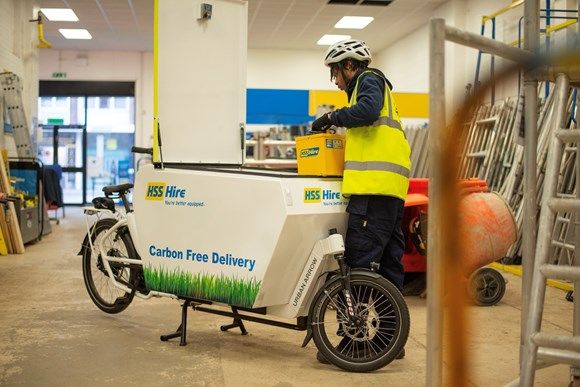Transport for London has launched a new plan to work with local authorities, businesses and the logistics industry on the use of cargo bikes.
The transport body made the move due to the increased usage of cargo bikes for freight and servicing trips with multinational firms such as Amazon and DHL using the transport mode across their operations.
The plan includes the development of a London safety standard for cargo bikes; micro-hubs and parking support; identifying key cargo bike routes; procurement policies on bikes; adapting TfL cycling schemes for cargo bike capacity; and promotion within schemes such as Low Traffic Neighbourhoods and borough-led vehicle emissions-based schemes.
Road transport
Half the value of household expenditure in London relies on freight with 90% of all goods transported by road. With a requirement to reduce nitrogen dioxide emissions, TfL sees cargo bikes as one option to reduce air pollution with potential to reduce 4% of van kilometres by 2030 across the capital. The figure rises to 17% of van kilometres for the same period in central London. Carbon savings from cargo bike growth across Greater London will be up to 30,000 tonnes of CO2 a year by the end of the decade.
Will Norman, Walking and Cycling Commissioner, said: “Cargo bikes are no longer a niche concept, and they can be real game changers when it comes to delivering freight and servicing trips. Not only do they provide environmental benefits by not contributing to air pollution, they also make journeys more efficient, and present a much lower risk of danger to people walking and cycling than vans and HGVs.”
Christina Calderato, TfL’s Director of Strategy and Policy, said: “Freight and servicing are the lifeblood of London’s economy but also contribute to air pollution, carbon emissions and traffic congestion. We are determined to provide a green, healthy and sustainable future for all Londoners and cargo bikes can play a vital role in cutting carbon emissions, air pollution and road danger. We will continue to work closely with our industry partners, businesses and boroughs across the capital to make our vision for cleaner and safer freight a reality.”
Vital stage of growth
Rob King, co-founder and CEO of Zedify, said: “Our research shows that cargo bikes can save over 90 per cent CO2 emissions per km compared to electric vehicles. With ecommerce growing, it’s clear they have a serious role to play in decarbonising UK transport. Cargo bike logistics has hit a vital stage of growth but it’s still a young sector and we need to invest in the ecosystem with things like product development as well as finance and insurance options.”
Carl Lomas, Chairman of the Institute of Couriers, said: “Cargo Bikes are delivering an accelerating volume of clean air final mile to streets of London, delivering packets and parcels with zero emission.”
Beryl CEO and co-founder, Phil Ellis, said: “What we have learned from running e-cargo bike hire schemes in London is that they can be incredibly useful to many people, from businesses and tradesmen to families and individuals.
“They’re really unique in terms of offering a sustainable, fast and efficient way to shuttle goods across urban environments; making them perfect for a wide range of tasks from carrying tools and delivering packages to getting your shopping done.
“They’re also cost effective, removing many of the expenses associated with private vehicle ownership such as fuel, storage, tax, MOT and maintenance.“
Image courtesy of TfL








